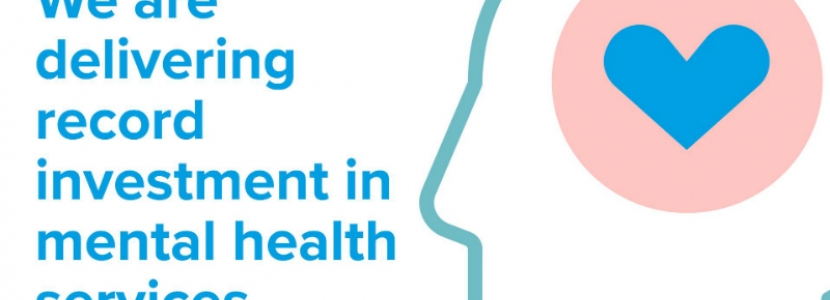
Mario is encouraging people across Croydon to come together for Mental Health Awareness Week, to listen to others and to highlight the support that is available to those who need it most.
Our Long-Term Plan for the NHS will grow mental health services faster than the overall NHS budget, improving access to services and enabling more people to receive better support and treatment.
The Conservative Party is ensuring that mental illness is not a hidden injustice so that everyone can get the care and support they need to be happy and to reach their full potential.
Commenting, Mario said:
“Since the Conservatives have been in Government, we have been committed to making mental health as much of as a priority as physical health and have increased mental health funding to record levels. But too many people are still not getting the right support on mental health issues, which is why this Government is not resting on its laurels and will continue to invest to provide everyone with the care and support they need.
“The Conservative Party is committed to helping people to access the right support when they need it, and during Mental Health Awareness Week I would urge everyone across Croydon to listen to your friends and family, and to encourage people to seek help when they need it.”
The Conservative Government’s support includes:
- Increasing total mental health spending to reach a record high of £11.86 billion.
- Investing an additional £2.3 billion a year into mental health services by 2023/24 on top of existing funding commitments as part of our Long-Term Plan for the NHS, enabling faster access to community and crisis mental health services for both adults and giving more than 370,000 adults and older adults with severe mental illnesses greater choice and control over their care.
- Providing an additional £1.4 billion up to 2020-21 to improve access to mental health services for children and young people, including funding and training for designated mental health support teams in schools.
- Providing an additional £300 million to deliver the Children and Young People’s Mental Health Green Paper.
- Encouraging nearly 370 schools to join one of the largest trials in the world to test different approaches to supporting young people’s mental health.
- Highlighting the trends and issues in young people’s mental well-being for the first time, committing to publishing a ‘State of the Nation’ report every year on World Mental Health Day, highlighting the trends and issues in young people’s mental well-being.
- Publishing our Online Harms White Paper to protect children’s mental health online.
- Appointing the UK’s first Minister for Suicide Prevention to lead government efforts to cut the number of suicides and overcome the stigma that stops people seeking help.
- Funding to help rough sleepers living with mental illness, improving their access to vital healthcare.
- A £10 million package to increase mental health support for ex-service personnel.
- Launching the Veterans’ Gateway trial to check our veterans are receiving the care they deserve.
- Creation of a new student mental health taskforce to help people manage challenges in university.
We are investing a record amount in mental health services. Mental health funding has increased to a record £11.86 billion in 2017-18, with CCGs now required to increase their spending on mental health services each year (Hansard, WA 179095, 15 October 2018, link; Hansard, Vol.639, 19 April 2018, link).
£2.3 billion of our £33.9 billion investment in the NHS will be spent on mental health services. This means mental health services will receive a growing share of the NHS budget (NHS England, NHS Long Term Plan, 7 January 2019, link).
With this funding, we will establish a new mental health crisis service. Using the money allocated in the Budget, we will provide comprehensive mental health support available in every major A&E; children and young peoples’ crisis teams in every part of the country; more mental health ambulances; more ‘safe havens’ in the community; and a 24-hour mental health crisis hotline (Hansard, Vol.648 Col.656, 29 October 2018, link).
Our long-term plan for the NHS also sets out other ways in which this funding will improve access to mental health services. The plans will improve services for people with common and severe mental health problems, make more care available in the community, boost emergency and inpatient care, and ensure suicide prevention remains a priority (NHS England, NHS Long Term Plan, 7 January 2019, link).
We are working to give parity of esteem to the treatment of mental health. In 2012 we legislated for parity of esteem between mental and physical health and we continue to work towards this goal, with the Prime Minister including it as one of her five priorities for the NHS when she announced £20.5 billion of additional funding in June (Hansard, Vol.619 Col.65, 9 January 2017, link; Prime Minister’s Office, Speech on the NHS, 18 June 2018, link).
We introduced the first ever waiting time standards for mental health. Introduced in 2014, the standards brought mental health into line with other NHS services (DHSC, Press Release, 14 October 2014, link).
We appointed the UK’s first Minister for Suicide Prevention to lead government efforts to cut the number of suicides and overcome the stigma that stops people seeking help. Jackie Doyle-Price will lead a new national effort on suicide prevention, bringing together a ministerial taskforce and working with national and local government, experts in suicide and self-harm prevention, charities, clinicians and those personally affected by suicide (Prime Minister’s Office, Press Release, 9 October 2018, link).
We are investing in mental health services for young people to ensure they can access support when they need it. We are providing an additional £1.4 billion up to 2020-21 to improve access to mental health services for children and young people, and an additional £300 million over the next three years to deliver the Children and Young People’s Mental Health Green Paper (Hansard, WQ125663, 7 February 2018, link; Hansard, WQ170687, 10 September 2018, link).
We recognise that half of all mental illness begins by the age of 14 and are taking action to address problems early. Our Green Paper will provide designated mental health leads in schools, earlier access to services through the creation of new Mental Health Support Teams, and pilot a new four-week waiting time standard for young people to ensure everyone receives treatment in the right place at the right time (DfE and DHSC, Response to the Select Committee Report on the Green Paper, 25 July 2018, link).
We are highlighting the trends and issues in young people’s mental well-being for the first time. Starting in 2019, we will publish a ‘State of the Nation’ report every year on World Mental Health Day, highlighting the trends and issues in young people’s mental well-being – the first time children’s mental health will be reported in this way, alongside their physical health and academic attainment (Prime Minister’s Office, Press Release, 9 October 2018, link).
We have published our Online Harms White Paper to protect peoples’ mental health online. Technology can be hugely beneficial, but we must ensure it does not damage peoples’ mental health. Our White Paper sets out the responsibilities of online platforms to protect users (DCMS, Press Release, 8 April 2019, link).
NHS England’s regional specialised mental health commissioning teams are implementing a range of recommendations to improve children and adolescent mental health services, including eliminating inappropriate under-18 placements in adult beds (NHS England, Children and Adolescent Mental Health Service Inpatient Services, accessed 29 August 2018, link).


